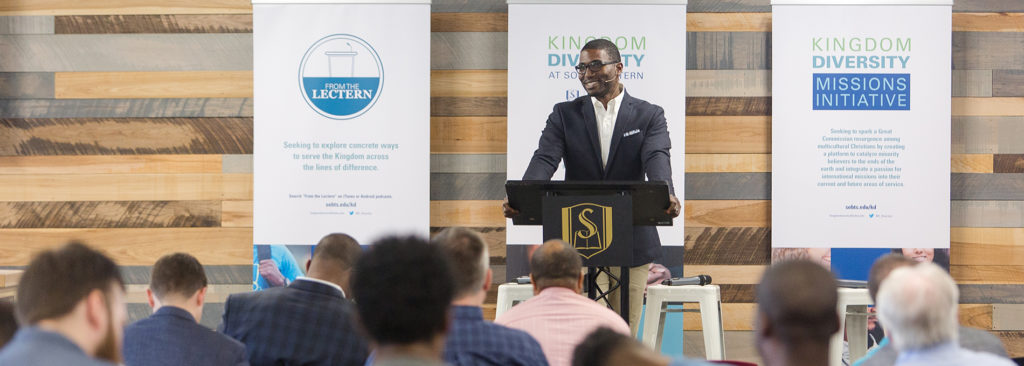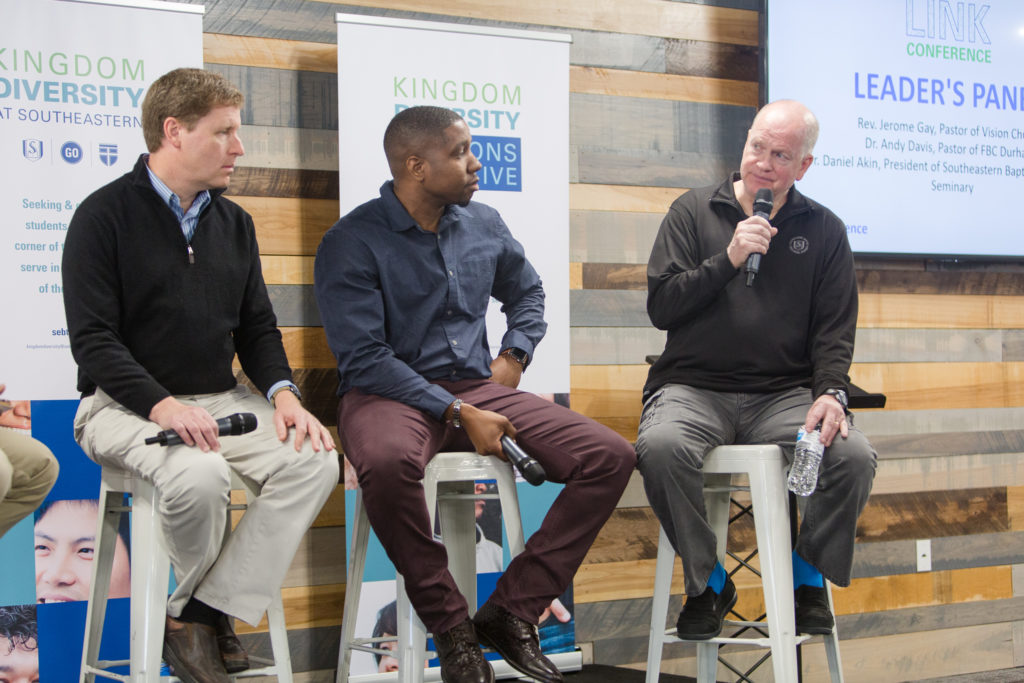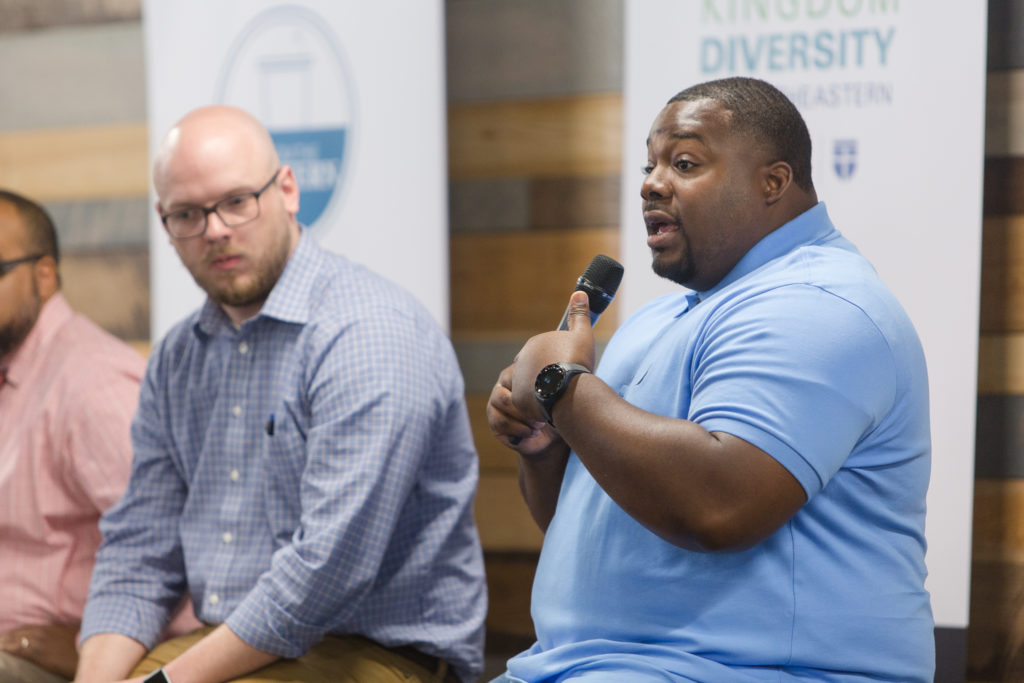Link Conference: “A catalyst toward change” in multicultural ministry
Lauren Pratt | April 18, 2018

On April 13, the Kingdom Diversity Initiative (KDI) at Southeastern Baptist Theological Seminary (SEBTS) hosted the Link Conference to discuss how to put multicultural passion into informed practice. Due to racism’s damaging effects, speakers at the conference gave multiple perspectives for how a church can begin breaking down barriers within congregations.
Walter Strickland, associate vice president for diversity and instructor of theology at SEBTS, began the conference by speaking about the layers of racism and why it presents a challenge for church leaders to overcome. He acknowledged the many layers of racism that exist that create difficulty for leaders in creating multicultural environments within the church.
“What we’re trying to do today is have this moment as being a catalyst towards change,” said Strickland.
Strickland noted that it is significant for churches to have structures that support a diverse community, allowing for a multiplicity of perspectives to establish and examine new and existing programs and procedures.
The last two sessions of the day included two panels moderated by Strickland. The first panel featured a discussion on how church leaders can strive toward organizational structures that support diversity. The panelists were Danny Akin, president of SEBTS; Andy Davis, senior pastor of First Baptist Durham in Durham, North Carolina; and Jerome Gay, lead pastor of preaching and vision at Vision Church in Raleigh, North Carolina.
In speaking to the question of how each church or organization has supported minorities while pursuing diversity, Davis noted his conviction over Strickland’s opening session and how he recognized his church’s great need to make changes toward diversity.
“My passion and my desire for that has been necessary, but insufficient,” said Davis.
Gay discussed the importance of pursuing diversity and supporting minority leaders by creating a culture of “eclecticity” at Vision Church, noting that there is no “monolithic” race, but instead there is the recognition that even within race, cultures vary. Gay also emphasized that feedback from other minorities is key.
“That feedback is sometimes painful, but it’s necessary,” said Gay.
Akin said that at Southeastern, intentionality has been essential as he has built trust with a variety of people who can speak honestly to blind spots he may not see in the institution.
“It’s one thing to say we want to be an ethnically diverse community; it’s another thing to actively work to make it happen,” said Akin, who has seen SEBTS grow significantly in its diversity in the past 14 years that he has been president.
The second panel focused more heavily on the relational outworking of unifying the church in the midst of cultural differences. The panelists were Matthew Hodges, lay leader at Christ Our King Community Church in Raleigh, North Carolina; Jesse Parker, elder at Vision Church; and Aaron Anderson, pastor of Vintage Church Durham in Durham, North Carolina.
As a white elder at a predominantly black church, Parker addressed how he navigates conversations with others when it comes to racial and cultural differences. He acknowledged that he has to wrestle with what he has perceived as a “normative experience” based on his context as a white man.
“I have to have the awareness of how I’ve been shaped by my own experience to actually engage and interact with that,” said Parker. “Otherwise, I’m just going to retreat or I’m just going to attack instead of actually engaging.”
Even in how Parker teaches at Vision Church, he has to think critically about how he has looked at certain issues in light of his background and the questions that could be raised in light of the backgrounds of the people in the congregation. He gave the example of how he addresses pro-life issues, noting that he advocates for life on multiple levels, whether that involves barriers through abortion, police brutality, systematic racism or more.
“I’m dealing with pro-life issues, but I’m dealing with it in a lot of ways that my traditional white environment hasn’t forced me to think about,” said Parker.
Anderson emphasized the importance of humility in relationships and not allowing a spirit of entitlement even when the lack of understanding from brothers and sisters in Christ is painful.
“If your identity is tied to some type of entitlement you’ll always be shaky. There will always be some type of discontentment,” said Anderson.
Ultimately, said Anderson, God brings reconciliation and healing.
“I can still love you and walk with you through this and trust God to do the healing that only he can do through his Spirit,” said Anderson.

Overcoming multicultural barriers and leading people to think this way is non-negotiable for Hodges.
“If you’re in leadership, this has to be a gospel conviction, “ said Hodges. “This cannot be a gospel elective.”
Leaders need to do what he calls a “spiritual audit” by making sure the leadership team is ready for bringing diversity and bridging cultural divides.
Hodges told those in attendance to think of the acronym “L.I.S.T.E.N” when it comes to pursuing reconciliation in the church, which involves leadership, intentionality, sacrifice, time, energy and never giving up.
Both panels allowed for a time of questions from the audience.
KDI started in Fall 2013 and promotes diversity through hosting campus events and discussions centered on topics regarding underrepresented populations and how the gospel intersects with these issues in culture. For more information, visit kingdomdiversity.sebts.edu.